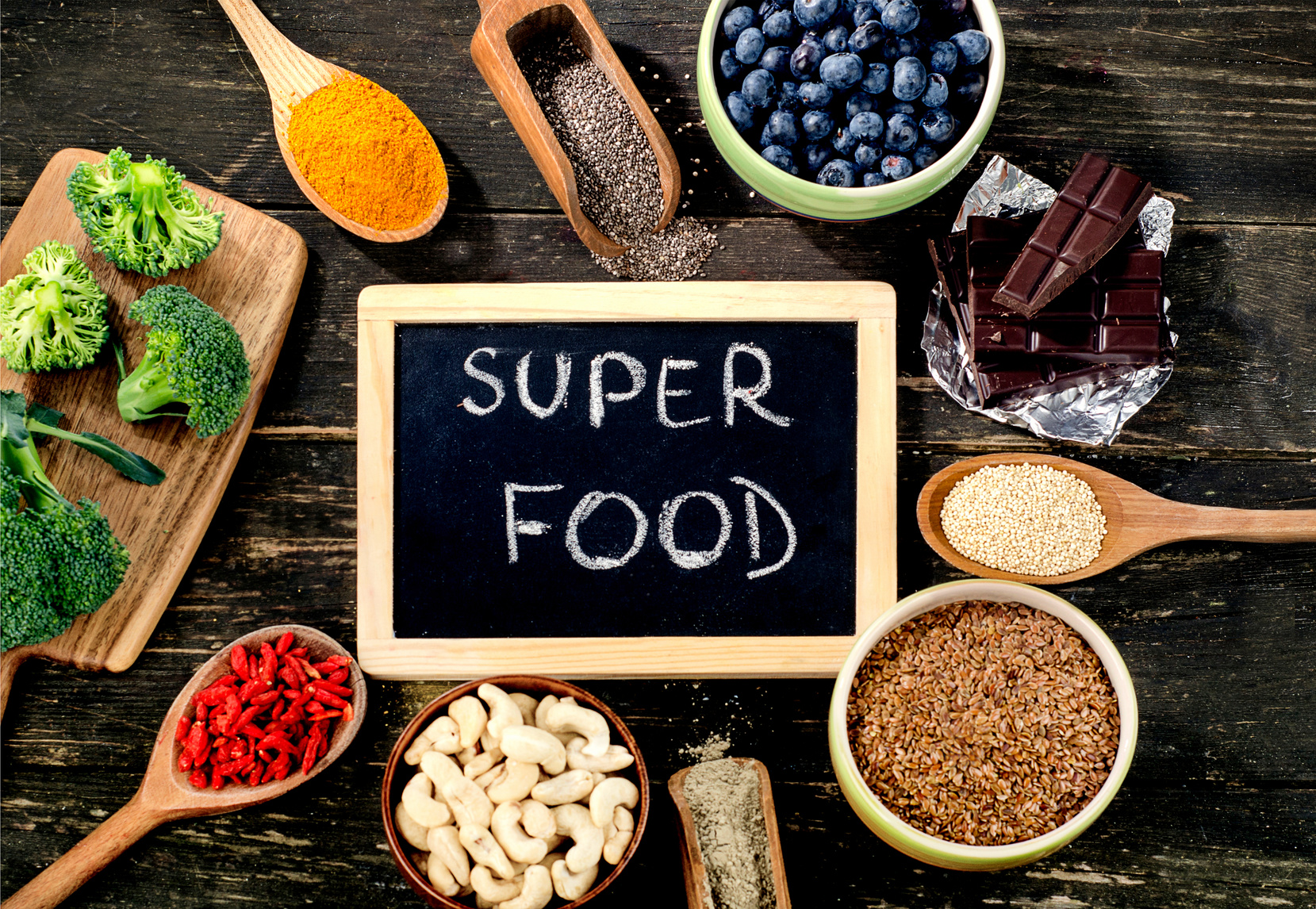What is the latest Superfood you think you should be eating? Beet juice? Maca? Or, what have you managed to stuff into your daily diet but are wondering why? Kale chips, anyone? At least once a day, I see a news story on the newest superfood. What are we missing?
The word “superfood” means different things to different writers. Some articles tout superfoods as concentrated sources of some nutrient(s) we usually have trouble getting from our usual foods. Other writers want us to think superfoods are a magical cure for a hard-to-treat condition like fatigue or chronic pain. And still others want us to think they’ve found the perfect food, providing all the nutrients we need in the “right” balance, in something that tastes like a cookie!
Let’s dispel those ideas right away: there are no foods that fit any of those definitions. So if you’re looking for a substitute for vegetables, whole grains, fruits, and dairy products, you can just move on. Nothing to see here.
Most of us get most of the nutrients we need from the food we eat, even your toddler who seems to live on chicken nuggets and your vegan sister. The nutrients some of us need that we might have trouble getting from food—calcium and vitamin D (maybe)—are best obtained from milk products like yogurt (calcium, and no, frozen yogurt and milk chocolate don’t count), and the only decent food sources of vitamin D are, again, milk (which actually has the vitamin added to it), fatty fish like salmon, and…cod liver oil. The problem with cod liver oil is that because of its content of another vitamin, A, it shouldn’t be taken in large amounts…and oh, yeah, it tastes terrible! Vegans can get calcium from fortified soymilk and leafy greens and vitamin D from various fortified foods.
As for substances like antioxidants, no one knows how much of those we really need (believe it or not, some evidence suggests we don’t need very much at all), and if we do need them, we probably get enough from a serving or two of vegetables like peppers and fruits like blueberries. No one wants to believe this because the advice to consume more of the usual dairy products, fish, and vegetables is just not exciting. But more importantly, it doesn’t make for attention grabbing headlines and doesn’t create a market for new products like $10 acai berry and quinoa bowls!
And no one food provides all the nutrients we need in a normal serving. The only thing that might come close is a veggie pizza on a whole wheat crust, but even that seemingly appealing choice falls short for a few important nutrients and probably packs too much sodium (salt).
A month or so ago, the LA Times ran an article about some of the latest superfoods, mostly things I’d never heard of! Mysteriousness seems to be a feature of proposed superfoods, these days (as opposed to a few years ago, when blueberries were the newest superfood). I think that’s because if most of us have never heard of it, there’s less chance of someone pointing out that the emperor really has no clothes on and that there’s no scientific research behind it. And if no one’s heard of it, you know a bunch of people are going to try to cash in.
One of the supposed superfoods featured in the LA Times article was maca root. The article extolled maca’s powers to do everything from boosting energy to balancing hormones. Everything is supposed to boost energy: And because we all think we need more energy and because energy is nothing more than calories, energy boosting is about as worthless a claim as there is. But this idea of hormone balancing was what really made alarm bells go off in my head. Substances that actually affect human hormones are not to be played with, popped like plain chocolate m&ms!
Now unlike most of these supposed superfoods you read about, which are never tested in real scientific experiments in humans at all, maca root was actually tested in one recently published study in live humans; this study was conducted by legitimate researchers (as opposed to a probably nonexistent research lab at the dietary supplement company), although the number of people they studied was tiny. The researchers found that very carefully prepared maca root helped prevent the loss of libido sometimes reported by people taking certain antidepressants. This is great news if you have major depressive disorder and you’re taking that type of medication and you’ve lost your desire for sex. But if you are that person, you need to know that the researchers used maca root that had been carefully purified in their lab and tested by an independent, well-respected analytic lab to verify the amount of maca root it contained and to ensure it contained nothing else…This is a far cry from the stuff you’ll find online or at your local health food store! Commercially available herbal supplements—the stuff you’ll find online and at health food stores—is seldom, if ever, tested, and some commercial maca has caused people to fail drug tests for performance enhancing drugs, that is, steroids!
So if you were thinking maca might be a “natural” way to feel more energetic, have greater libido, or have fewer hot flashes, you need to think again. Remember: just because something comes from a plant and is “natural” by no means guarantees that it’s safe or healthy or better for you than a medication your doctor prescribes, and in fact the opposite is most likely true (remember: poison ivy, deadly nightshade, heroin, and arsenic are all natural!).
If you really want to fill your kitchen with super foods, the advice remains the same as always: head to the produce department of your local supermarket. Or if you really want to change things up, head to the farmer’s market, where the produce might be super fresh as well!
Superfoods: Super Hype?
